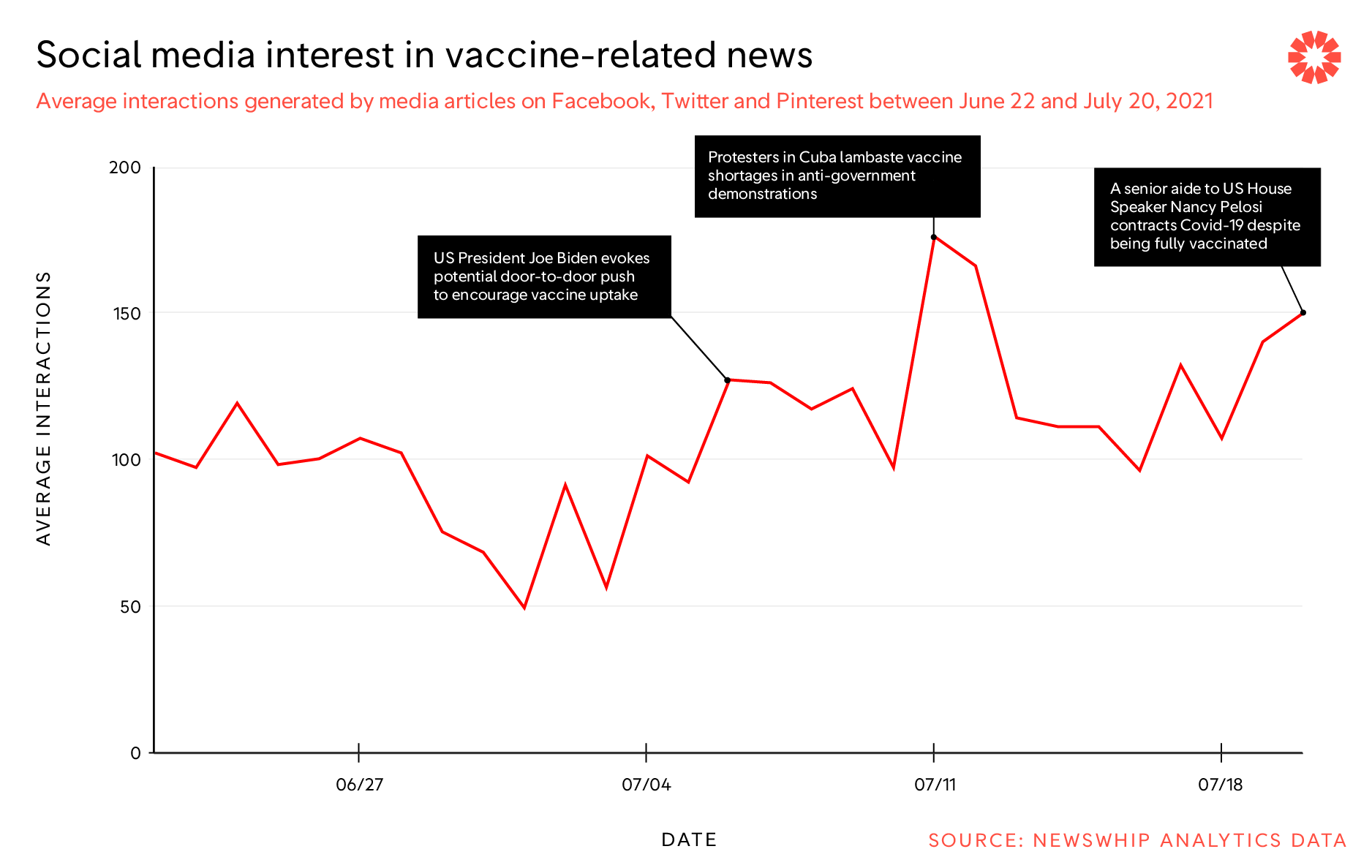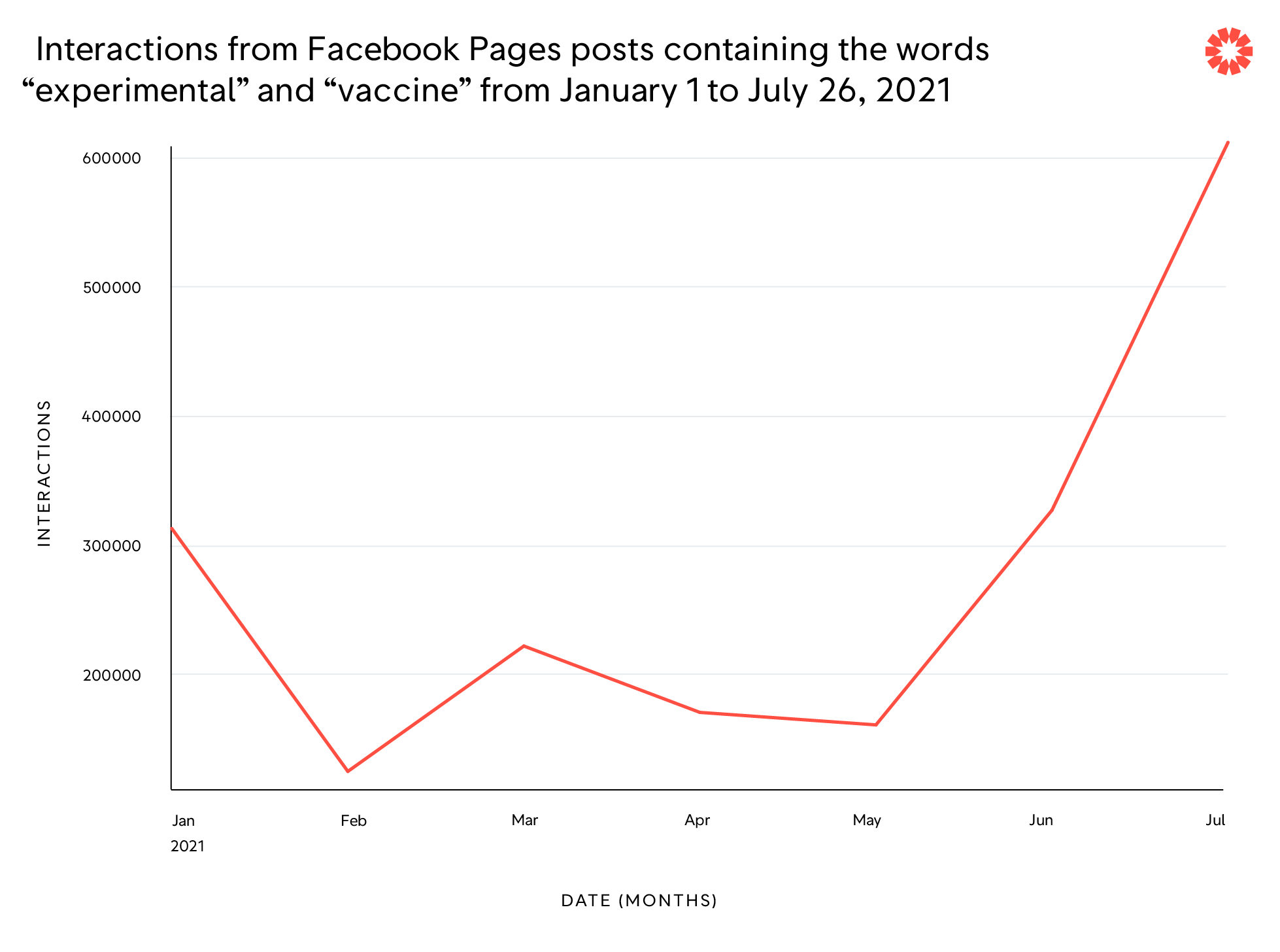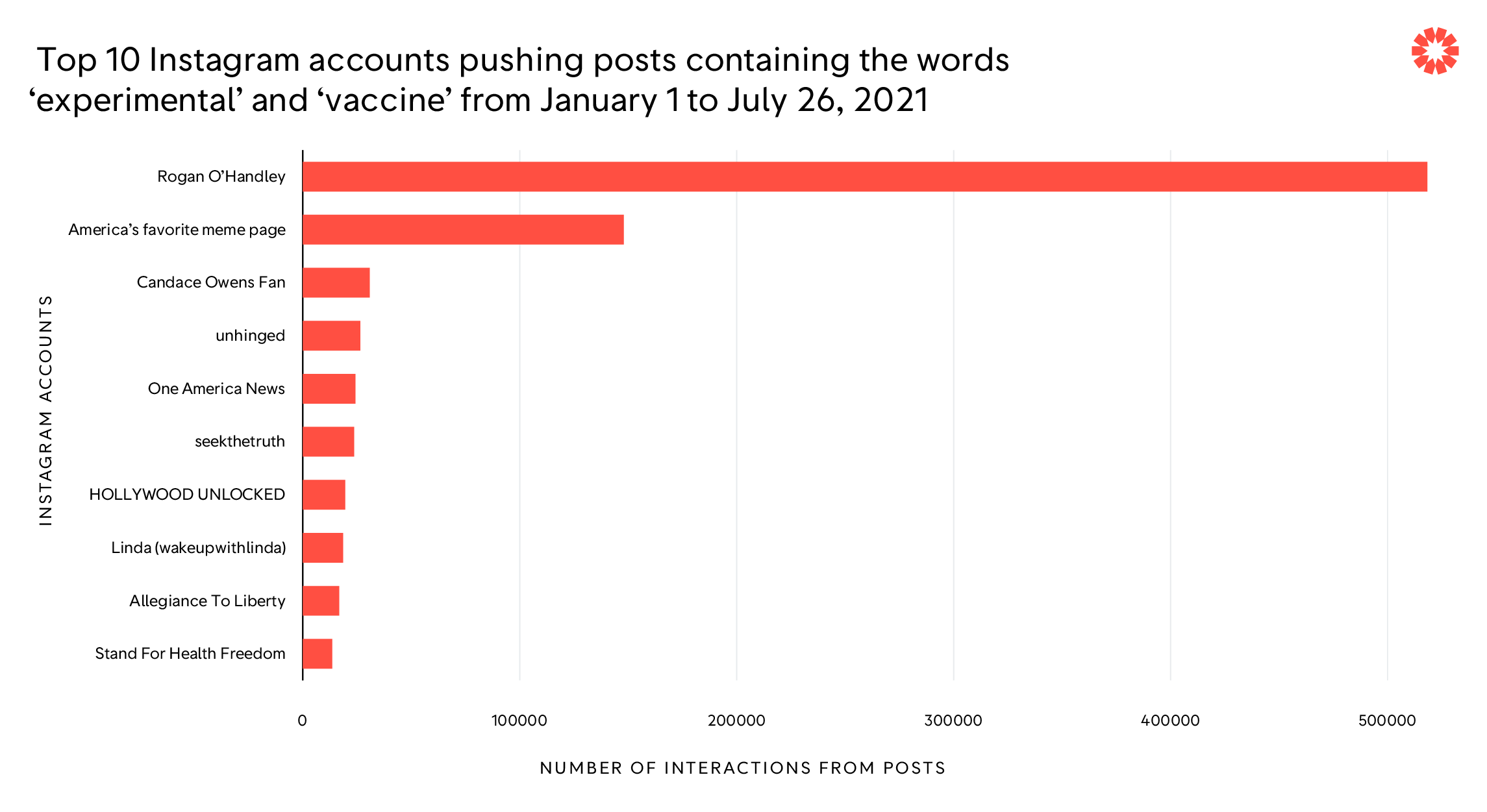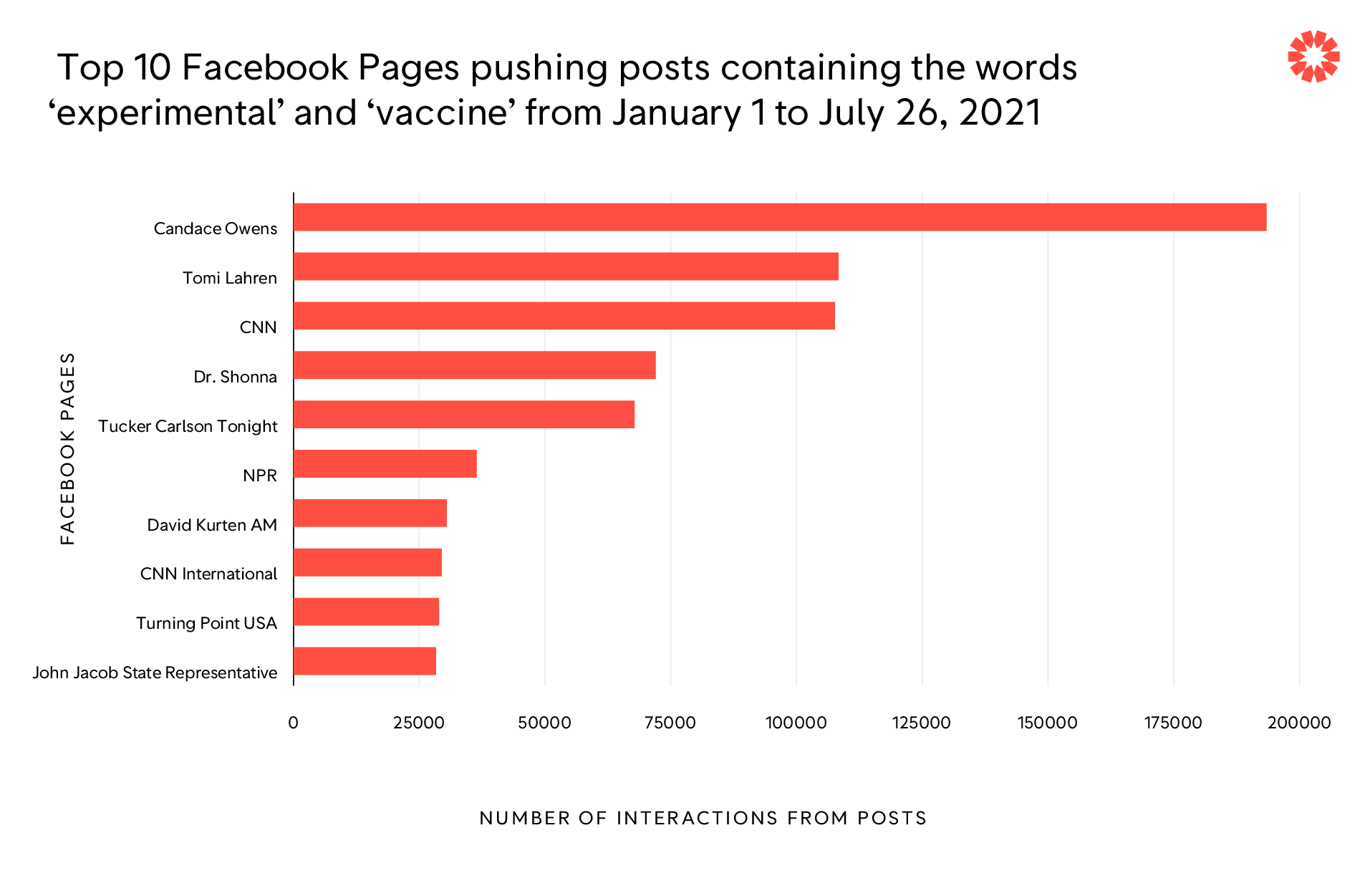This is the fourth and final installment of our insights report series, which provides a summary of the key trends and insights on information disorder related to vaccines over the past month. As First Draft continues to monitor Covid-19 vaccine misinformation around the world, these reports are designed to highlight the most relevant media trends, narratives, emerging threats and data deficits we identify.
Media Trends
During July, English-language coverage of vaccines centered around new mask- wearing guidance, the effectiveness of the Pfizer and Moderna vaccines, and US government efforts to promote vaccination amid sharp rises in new cases of the Delta variant.
CNBC’s report on the World Health Organization’s (WHO) new mask guidance for fully vaccinated people was the most engaged-with article across Facebook, Twitter and Pinterest, with more than 200,000 social interactions. The WHO’s warning on mix-and-match vaccine policies also attracted significant interest on social media.
As the spread of the Delta variant accelerated in both the US and the UK, vaccine effectiveness came to the forefront of the news cycle. An NPR article titled “Moderna Says Studies Show Its Vaccine Is Effective Against The Delta Variant” received more than 85,000 interactions; a New York Times report on the duration of immunity afforded by the Pfizer and Moderna vaccines garnered 98,000 interactions.

American right-leaning media sites The Daily Wire and Fox News amplified opposition to President Joe Biden’s proposed “door-to-door” vaccine outreach strategy. Two of their related articles featured among the top 30 most engaged-with media articles.
These sources, as well as other highly followed right-leaning news outlets, also generated significant traction thanks to their coverage of breakthrough infections among vaccinated people. Three stories on fully vaccinated White House aides contracting coronavirus generated more than 45,000 interactions.
Twitter’s decision to temporarily suspend the account of US Representative Marjorie Taylor Greene and renewed concerns over the prevalence of unvaccinated people among those hospitalized with coronavirus also featured heavily among English-language media reports in July.
Vaccine Narratives
Covid-19 vaccines are experimental
Ever since the first Covid-19 vaccines began to be rolled out in the United States in December 2020, anti-vaccine sources have weaponized the “emergency use” authorization granted to these vaccines to push the misleading narrative that Covid-19 immunization campaigns are akin to mass experiments.
In the early months of the year, the spread of this narrative was largely driven by pro-Russian and North American anti-science disinformation networks that employed sophisticated artificial amplification tactics to penetrate large social media networks and reach multiple language communities online.
But as several EU member states including Ireland, France and Italy announced plans to impose de facto mandatory vaccination policies, many highly followed right- and far-right-leaning politicians have voiced their opposition to these measures on the claim that these vaccines are experimental. As a result, the idea that Covid-19 vaccines are risky experiments has re-established itself as one of the most dominant anti-vaccine narratives on social media (See the “In Focus” section below).
Similarly in the US, where Biden has recently touted new measures to boost stagnating vaccine rates, right-wing figures with highly followed social media channels have repeatedly amplified the “experimental” narrative to justify their opposition to Covid-19 vaccines.
Covid-19 vaccines are ineffective and unnecessary
The misinformation narrative that Covid-19 vaccines are ineffective and thus unnecessary was already pervading Anglophone social media before the start of the global vaccine rollout. At the time, the narrative was largely amplified by false claims that the protection afforded by people’s natural immune systems was superior to that provided through vaccine coverage. But a few months after the first Covid-19 vaccine doses were administered in December 2020, and as the real-world effects of Covid-19 vaccines begin to emerge, reports of “breakthrough” infections among fully vaccinated people are being used to promote the misleading narrative that these vaccines are ineffective and unnecessary.
Part of the appeal of these narratives can be traced back to the illusion of the silver bullet (the idea that vaccines are a guaranteed ticket to a return to normalcy). This misleading narrative was primarily amplified by decontextualized media headlines that reported near 100 per cent effectiveness rates for the Pfizer and Moderna vaccines. These figures were based on interim analyses of Phase 3 clinical trial results provided by the vaccines’ manufacturers.
Not only did these headlines blur the critical distinction between vaccine efficacy and effectiveness, they implicitly conveyed the false idea that Covid-19 vaccines were almost 100 per cent effective in curbing all infections and transmissions as well as hospitalizations and deaths. Recent reports on breakthrough infections among fully vaccinated people appear to contradict the notion that vaccines are 100 per cent effective against all infections, potentially increasing popular skepticism.
With both vaccine coverage levels and new daily case rates rising in many countries, the number of fully vaccinated people contracting Covid-19 is likely to grow. Additional media reports of such “breakthrough” infections may continue to amplify the false idea that Covid-19 vaccines are ineffective and therefore unnecessary. On the other hand, a greater emphasis on vaccines’ success in preventing these infections from resulting in hospitalizations and deaths could act as a counterweight to these false narratives and encourage vaccine uptake.
Covid-19 variants are part of a US government scare tactic to curb “freedom” and control the population
False narratives downplaying the severity of Covid-19 and outright rejecting the existence of the disease have featured heavily on social media since the beginning of the pandemic. So too have narratives supporting the ideas of liberty and freedom above all else, even public health.
Over the last month we have seen the marriage of these two narratives in the context of the emergence of variants of the coronavirus. As the Delta variant sweeps over much of the US, right-leaning accounts and anti-vaccine activists on social media have pushed the unsubstantiated narrative that the US government and the news media are exaggerating the severity of Delta to control the population through projected mandatory vaccinations and lockdowns. Some posts supporting this narrative have gone as far as suggesting, falsely, that the Delta variant doesn’t exist but was fabricated to realize the aforementioned goals.
Contradictory messaging from official health institutions and the media around the severity of Covid-19 variants and the effectiveness of masks have provided fertile ground for this latest round of false claims to flourish. As we have seen throughout the pandemic, the flip-flopping of official guidelines can erode trust in institutions and result in waves of rumor and misinformation.
To be clear, the Delta variant is real; the Centers for Disease Control and Prevention estimates that 83 per cent of cases in the US are of the Delta strain. Furthermore, the Delta variant is far more transmissible than earlier strains of the disease. There are also indications that Delta may be a more severe form of Covid-19 than the original Alpha strain.
Despite the recent increase in Covid-19 cases and deaths, most of which have occurred among the unvaccinated, right-leaning accounts on social media have used Delta to downplay the severity and existence of the variant and further politicize Covid-19, reframing the disease as an issue related to “freedom” rather than public health.
Emerging threats and data deficits
Data deficits are where high levels of demand for information about a topic are not adequately matched by a supply of credible information. Where data deficits exist, rumors, speculation and misinformation are more likely to spread. Countering data deficits requires healthcare providers and institutions to engage in pre-emptive research that can inform proactive messaging, such as “prebunks” and explainer pieces.
September booster doses
When vaccine manufacturers suggested the potential need for booster shots to be administered before the end of the year, anti-vaccine sources weaponized the issue to push the idea that boosters would serve only the financial interests of pharmaceutical companies and not the health of the general public.
Conversations around booster shots intensified within health policymaking circles and on social media after the UK government suggested booster shots could be offered as early as September.
Since then, more governments have announced plans to roll out additional vaccine doses. But numerous experts and health authorities have expressed skepticism over the need for additional vaccine doses in the immediate future.
These divergences in official communications have the potential to generate confusion and result in skepticism among fully vaccinated people. This deficit in consistent and reliable information could also be filled with disinformation from online actors seeking to undermine trust in vaccines and the institutions connected to them.
Such inconsistencies must be addressed in order to prevent the spread of misleading, financially motivated anti-vaccine narratives as well as more far-reaching conspiracy theories that frame booster shots as part of longstanding plans to impose perpetual Covid-19 vaccination cycles.
mRNA vaccines and pregnancies
The lack of available data and research around the effects of Covid-19 vaccines among pregnant women has provided openings for misinformation and false claims discouraging women to take the vaccine. This prolonged data deficit has hindered journalists and researchers from roundly debunking the claims.
The World Health Organization and the CDC have recently said that both mRNA-based vaccines — Pfizer and Moderna — are safe for pregnant women. And in June, The New England Journal of Medicine published a preliminary study of 35,000 participants that found no “obvious safety signals” for pregnant women who had received mRNA vaccines.
Still, false claims have continued to spread. Some conspiracy theorists, such as Alex Jones, Mike Adams and DeAnna Lorraine, have used The New England Journal of Medicine study to falsely claim it concluded that “82% of Pregnant Women in Study Had Miscarriage.” These videos have garnered tens of thousands of views on sites such as BitChute and Rumble, and have been widely shared on Twitter, Facebook and other more mainstream social media platforms.
FDA warnings about Johnson & Johnson vaccine
Unevidenced narratives challenging the safety of vaccines have been popular on social media since before the rollout of Covid-19 vaccines in December 2020. Over the past nine months, these narratives have often been paired with misleading claims about Covid-19 vaccines being rushed and untested, further amplifying the claim that Covid-19 vaccines are experimental and their recipients “guinea pigs.”
This sentiment reached a zenith in April following the pause of the Johnson & Johnson (Janssen) vaccine in the US and the decision in many European countries to restrict the AstraZeneca vaccine to certain age groups. Anti-vaccine communities leveraged the negative publicity on social media, spreading misleading and exaggerated claims aimed at eroding trust in safety of Covid-19 vaccines more broadly.
Similar to the events in April, recent news that the Food and Drug Administration (FDA) will add a new warning on the Johnson & Johnson (Janssen) Covid-19 vaccine for a rare neurological disorder has resulted in a resurgence of misleading and unsubstantiated claims about the safety of Covid-19 vaccines. The warning was issued after the vaccine was linked to the rare yet serious Guillain-Barré syndrome. Of the 12.8 million doses of the Janssen vaccines administered, there have been only 100 reported cases of Guillain-Barré syndrome.
Nonetheless, this has not stopped anti-vaccine activists and a number of influencers on social media from amplifying overstated claims about the dangers of the Janssen vaccine — as well as Covid-19 vaccines more generally — and pushing the baseless idea that people are being used as test subjects. Because there are genuine concerns related to the safety of Covid-19 vaccines, misleading narratives focusing on safety issues, especially in the wake of public announcements, will continue to hinder efforts to build trust, not only in the Janssen vaccine but in all vaccines.









